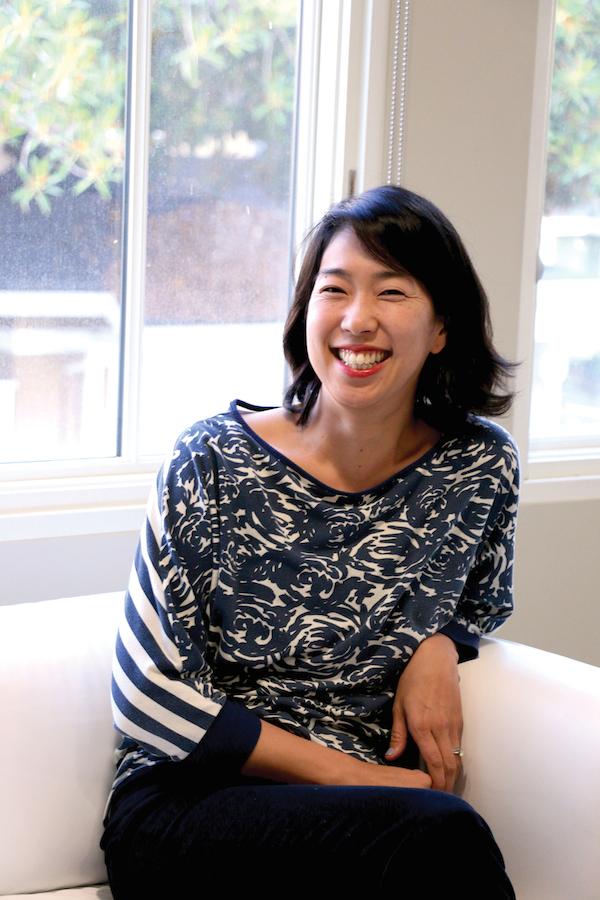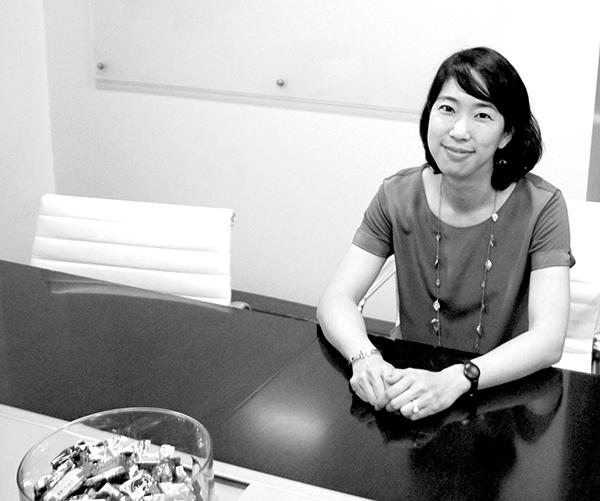Nearly two decades ago, when Ann Miura-Ko was still a student at Palo Alto High School, her dad gave her a piece of advice: No matter what you do, be world class at it. Now 37 and married with three kids, Miura-Ko is world class in every sense; Forbes calls her the “Most Powerful Woman in Startups.”
As a venture capitalist, Miura-Ko reviews about 150 pitches a week for such cutting edge innovations as a metal box that she says was intended to be a next-generation toaster oven. Where the entrepreneur should have included a typed business plan, he instead provided a handwritten letter and just in case the box got lost in the mail, he sent it to her five more times.
Today, Miura-Ko funds big data analytics and e-commerce companies. Her job: to distinguish the Twitters from the toaster ovens and invest accordingly.
After graduating from Paly in 1994, Miura-Ko studied electrical engineering at Yale University before earning her Ph.D. in computer programming at Stanford. There, she taught an entrepreneurship course with industry luminaries as mentors, one of whom was well-established venture capitalist Mike Maples, Jr.
In 2008, Miura-Ko approached Maples seeking advice for creating a startup. Already in the process of starting his second investment firm, Maples offered to bring her in. Together, the two co-founded Floodgate — now one of the most influential venture capital firms in Silicon Valley, having taken early stakes in well-known startups such as Twitter, ridesharing company Lyft and online retailer ModCloth.
“We get to work with the entrepreneurs before they get jaded and before everyone else believes in them,” Miura-Ko says. “I focus on that moment of inception to baby-nursing that company up to the point where it’s a teenager, and then we hand it off to the larger mega-fund.”
Before Floodgate was a $75 million investment firm, in the days of the toaster oven pitches, employees without corporate titles would describe themselves as “rockstars.” Miura-Ko, on the other hand, opted for the title “ninja assassin.”
“My brother and I were so obsessed with ninjas that he dressed up as a ninja 10 years in a row for Halloween,” Miura-Ko says. “I always thought, ‘If I want to be something, I don’t want to be a rockstar, I want to be a ninja assassin.’”
The entrepreneur, like the ninja assassin, must have more than just intelligence: she must also be tenacious, world class and passionate. Through a series of seemingly unrelated incidents, Miura-Ko managed to develop all three of these traits.
A Test of Tenacity
Miura-Ko, by her own admission, is known for her mix of perseverance and stubbornness. In her college application essay, she called it tenacity.
“Even in high school, I was someone who didn’t give up very easily and someone who didn’t take other people’s opinions into account,” she says. “That’s probably my fatal flaw, but it’s also a strong asset.”
In her sleepless, seven-course high school years, Miura-Ko learned that success is a result of hard work. Her senior year, she won the culminating high school speech and debate tournament, the Tournament of Champions, making her a billboard for high school success.
However, she almost quit the activity altogether sophomore year. Her parents believed that coming from an immigrant household that spoke only Japanese disadvantaged her in the speech and debate community. These concerns, combined with her initial lack of success, led her to question her prospect in the activity.
“My freshman and sophomore year, I was terrible at it. I was losing all the time,” she says. “My parents actually sat me down and told me, ‘If you’re only going to do two activities and one is a massive failure, that’s a problem. You’re not going to get into college in that equation.’”
Her parents gave her an ultimatum. If she didn’t succeed within the first few months of junior year, she would have to quit and re-allocate her time towards other “more productive” activities. Her gut instincts told her otherwise. The summer before junior year, Miura-Ko spent almost every day in Stanford’s libraries intensively researching and practicing for the upcoming debate season; she prepared for all 10 of the possible topics, even though only three would be chosen.
“I remember thinking to myself, ‘If I can just prepare myself to extent where I’ve out-prepared everyone, and I walk into a debate round having already won 90 percent of that round before it has even begun, then the odds are that I’ll actually do pretty well,” Miura-Ko says.
She uses the same mindset to this day. She acts on her instinct and sticks to her gut. More often than not, her tenacity pays off.
World Class Opportunities
Miura-Ko had a high bar set at an early age. Her father, a literal rocket scientist, constantly reminded her to adopt a world class work ethic, no matter how seemingly insignificant the assignment.
“I would turn in a calculus assignment, and my dad would say, ‘Is that a world class effort?’” Miura-Ko says. “I used to get really tired of that question.”
In college, as part of her work study program, Miura-Ko worked in the dean of engineering’s office. It was a simple, boring job: photocopying. Once again, her dad reminded her to be world class.
“I said, ‘Oh dad, it’s nothing to be world class at. It’s photocopying,’” Miura-Ko says. “He said, ‘Still, you should think about it,’ so I remember sitting in front of the photocopying machine and thinking about what it meant to be world class at that.”
She approached the situation from a new angle, treating every task as a challenge. Instead of just pressing the start button, she aligned the pages perfectly and adjusted the color balance. She photocopied so that there were no errors and became the fastest photocopier that the dean had ever seen.
Noting her work ethic, the dean asked her to give a special guest of his a tour of the Yale campus. On the tour, the guest asked about her plans for spring break and she told him that she would be going back home to Palo Alto, mildly embarrassed that her most productive plans consisted of visiting her parents. Surprisingly, he also worked in Palo Alto so he offered her an opportunity to shadow him for a week. He just so happened to be Lew Platt, the CEO of Hewlett Packard.
During Miura-Ko’s week at HP headquarters, Bill Gates also stopped by to make an announcement. After the externship, Platt sent her two pictures: the first of her sitting in a chair talking to Platt, the second of Bill Gates sitting in the exact chair holding a similar conversation. The photos still sit, side by side, in her office to this day.
“When you work your tail off and you try to be world class at the most mundane tasks, world class opportunities are provided,” Miura-Ko says. “It may not happen in the way you envisioned. It may not even happen in the time frame that you believed it would happen in, but those opportunities pop up.”
That moment changed the trajectory of her career path. Her entire life, she thought she was going to become a research scientist. Coming from a family of mechanical engineers, her biggest rebellion was majoring in electrical engineering, but witnessing Platt’s savvy decision-making led her to develop an interest in business as well.
The Art of Entrepreneurship
After graduating from Yale and beginning her Ph.D. program at Stanford, Miura-Ko approached Mike Maples Jr. for advice in creating a startup. As a venture capitalist, Maples worked fervently with entrepreneurs, so he let her shadow him to observe the early stages of entrepreneurship. During this process, he found that her instincts about developing startups were shockingly accurate and realized that her engineering background combined with his expertise in venture capital would make them the perfect team, so he offered her a job position. There was a catch: She had to start immediately.
A risky decision at the time, Miura-Ko joined Maples in founding Floodgate, pushing her Ph.D. program into the background.
“We started Floodgate perhaps with the worst timing ever, in 2008 with the financial crisis,” she says. “I was still a year from competing the Ph.D., I had a daughter who was a year and a half, and I was pregnant with my second child. You can just imagine the confluence of events that was the craziness that became the start of 2009.”
Amidst the craziness, her passion for nurturing entrepreneurs made the challenges seem insignificant.
“The most amazing part of my job is that I get to see the inception of so many different kinds of ideas,” Miura-Ko says. “As you see your companies become successful, having that history with the founder where no one else believed but we believed is a really good feeling.”
Miura-Ko says her tenacity and world class work ethic are the reasons for her success both in debate and in venture capital, but her initial motivation itself was inseparable from her passion.
She believes that finding your own story and your own voice is the most important thing that you can do in your high school years.
“As we live in an environment where you’re surrounded by high-achievers, the definition of what it means to be high-achieving becomes set in everyone’s mind,” she says. “As a result of that, it’s really hard to find your own place, but if you’re here because your parents told you to be here, you shouldn’t be here. You should go find the thing that when you wake up in the morning you can’t wait to do. That could be gardening, photography, movie-making or playing the piano. It doesn’t have to be research at Stanford.”
In her field, Miura-Ko sees the romanticized view of entrepreneurship lead individuals to start companies that they lack authentic passion for. She knows from experience that there’s nothing romantic in working 100-hour weeks without knowing whether the product will be a success.
“The way in which entrepreneurship is perceived has changed. It’s now considered to be a legitimate career path — there’s even an entrepreneur barbie,” she says. “Everyone is always thinking about becoming the next Mark Zuckerberg, but people forget that it’s better to be employee
No. 100 at a growing Facebook than employee No. 1 at a mobile app company that goes nowhere. Your time is the most important asset that you have. If you’re not spending every minute of that time on a really important problem, you’re wasting your most precious asset.”




